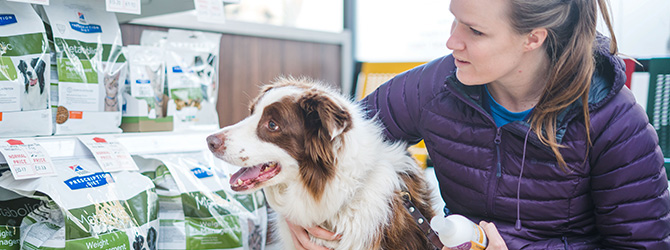Dog food allergies: does my dog need hypoallergenic dog food?
First Published: 06/02/2019
Last Updated: 09/10/2023
These days it seems half the population suffers from a food allergy or intolerance – whether they’re lactose intolerant, wheat-free or coeliac. But did you know your dog is just as likely to suffer from a sensitive stomach?
You may be surprised to learn that dog food allergies aren’t always triggered by a change in your pet’s diet – intolerances and allergies are just as likely to develop when you’ve been feeding your dog the same pet food for years. They often come without warning at any stage of your dog’s life, and can become more severe the more your dog is exposed to the allergen – so it’s important to seek advice from your vet if you suspect your dog has acquired an allergy.
What are the symptoms of dog food allergies?
The symptoms of dog food allergies are similar to the signs of other allergies – such as parasites, dust mites and pollen – so it’s important to get a diagnosis from your vet before you try to resolve the issue.
Hints that your pet may be suffering from a dog food allergy or intolerance include:
Signs and symptoms of allergies in dogs:
- itching
- scratching or licking, especially feet and ears
- skin rashes
- poor coat quality
- frequent ear infections
- difficulty breathing
- red, watery eyes
- sickness
- diarrhoea
What are the common causes of dog food allergies?
Dogs can develop an allergy to any ingredient in their diet, though certain meats and grains are more likely to cause an allergic reaction. Common allergens include eggs, wheat, fish, lamb, chicken, pork, dairy, and beef.
What is hypoallergenic dog food – and does my dog need it?
Your vet may recommend allergy testing or a diet trial to diagnose a dog food allergy, and may suggest an elimination or hypoallergenic diet to manage the condition.
Various brands of hypoallergenic dog food, and food for dogs with sensitive skin, are available. Be aware that some of these may still contain allergens your dog is sensitive to; your vet will advise you on the most suitable food for your dog, and you should always seek advice before making any significant change to your dog’s diet.
“Dog food allergies aren’t always triggered by a change in your pet’s diet – they’re just as likely to develop when you’ve been feeding your dog the same pet food for years.”
Need advice on dog food allergies?
For expert advice and treatment on dog food allergies, contact your local vet.
Find your nearest vet using our Find a Vet page, or speak to a vet online using Online Vets.


